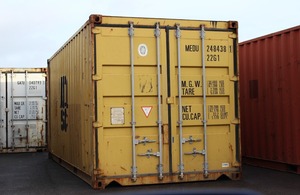Fairer charges scheme for regulating waste shipments comes into effect
Amended charges for international waste shipments come into force as of 1 April 2024

The Environment Agency has introduced a new and fairer charges scheme for regulating waste shipments, ensuring it can continue its work to protect people and the environment from hazardous waste.
The new system, agreed in consultation with industry, will support a sustainable regulatory system, boosting compliance while cutting down on delays in processing notifications.
Movements of certain waste to some destinations are subject to stricter notification controls. Waste shipped under these controls is known as ‘notified waste’ and the Environment Agency has an obligation to recover the costs of its regulatory activities through charges to its customers.
Following a public consultation launched last October, the new charges scheme for regulating notified waste shipments under the Transfrontier Shipment of Waste Regulations (2007) came into effect as of 1 April.
The changes will ensure charges are fairer and more reflective of the work the Environment Agency does. They also reflect that some more complex types of waste shipments cost more to regulate.
The changes being introduced include:
- New charges for anyone sending more than 1,000 shipments under a notification. This will ensure the Environment Agency recovers its costs for notifications for very large numbers of shipments.
- Two smaller bands for notifications for 101-300 and 301-500 shipments. This replaces the existing band for 101-500 shipments, so it better reflects the different costs associated with higher numbers of shipments.
- Removing the complexity around different charges for movements involving ‘interim sites’. This makes the scheme simpler for customers to understand and reflects how the Environment Agency regulates these notifications.
- A clearer definition of a single shipment to reflect the Environment Agency’s inspection costs and ensure a level playing field for operators.
- A fee for making any changes to an exports notification after the Environment Agency transmits it to overseas authorities or for imports after the regulator’s acknowledgement, where amendments are allowed. The Environment Agency currently makes some changes without charge which does not reflect the costs. However, the Environment Agency has taken on board the comments made by customers and reduced this charge to £82 per amendment, per notification where amendments can be made. The Environment Agency also will not charge where changes are requested by competent authorities unless changes are needed because of incorrect or incomplete information from the notifier.
- Additional charges for any notification that includes mercury, ozone-depleting substances (ODS), fluorinated gases (F-gases) or Naturally Occurring Radioactive Materials (NORM). These waste types are particularly complicated so only those operators that handle these types of waste should pay for the additional work to regulate them.
- A charge for the work required to assess applications for ‘pre-consented’ status for facilities in England. The Environment Agency does not currently charge for this work, but pre-consented sites can benefit from extended consenting timescales. The Environment Agency carries out work to ensure that sites continue to be suitable to receive notifiable wastes over an extended period.
- Different charges for applications for end-of-life ships, platforms and fixed oil rigs. Regulating these waste types is complex and they pose a significant environmental risk. The time taken to assess applications is therefore much higher than for other waste types, so it is fairer that operators handling these wastes pay for the full cost of moving them internationally.
The last amendments to international waste shipment charges were published in 2012 – and in the last decade, multiple factors including market trends and policies to improve environmental standards increased the costs of regulation.
As a result, the cost of the Environment Agency’s regulatory activities became greater than the fees it charged waste importers and exporters, leading to difficulties in funding compliance activities and delays in processing notifications.
The Environment Agency spends its income from charges on processing applications, data reporting and compliance work to ensure shipments are lawful and do not pose a risk to the environment. It has a responsibility to recover fully the costs of its regulatory activities via charges, avoiding costs being carried by the taxpayer.
Steve Molyneux, Environment Agency Deputy Director of Waste Regulation, said:
Waste and recycling must be properly managed, whether processed at home or abroad, and we monitor the export of waste from England to make certain it is.
We have an obligation to avoid passing on the costs of our regulatory activities to the taxpayer and prior to April had not increased our charges for regulating waste shipment notifications for more than a decade.
Our new scheme will support a regulatory system that works for all, as well as ensuring we continue to protect people and the environment from the impacts of hazardous waste.
The Environment Agency continues to pursue those who blight the lives of overseas communities through illegal exports and have introduced additional measures to tackle them, including by working closely with HM Revenue and Customs, reviewing inconsistencies between customs information and packaging data and creating an investigations team to target serious offenders.
The Environment Agency inspected 1,390 containers of waste in the 2021/22 financial year. Of these, 260 were returned to their site of loading which, combined with the Environment Agency’s regulatory interventions at waste sites, prevented the illegal export of more than 19,000 tonnes of waste.
Waste, waste treatment and especially recycling must be properly managed whether at home or abroad and the Environment Agency works closely with the waste industry and local authorities to safeguard the environment. It works – England is a much cleaner, greener place because of the Environment Agency’s activities.